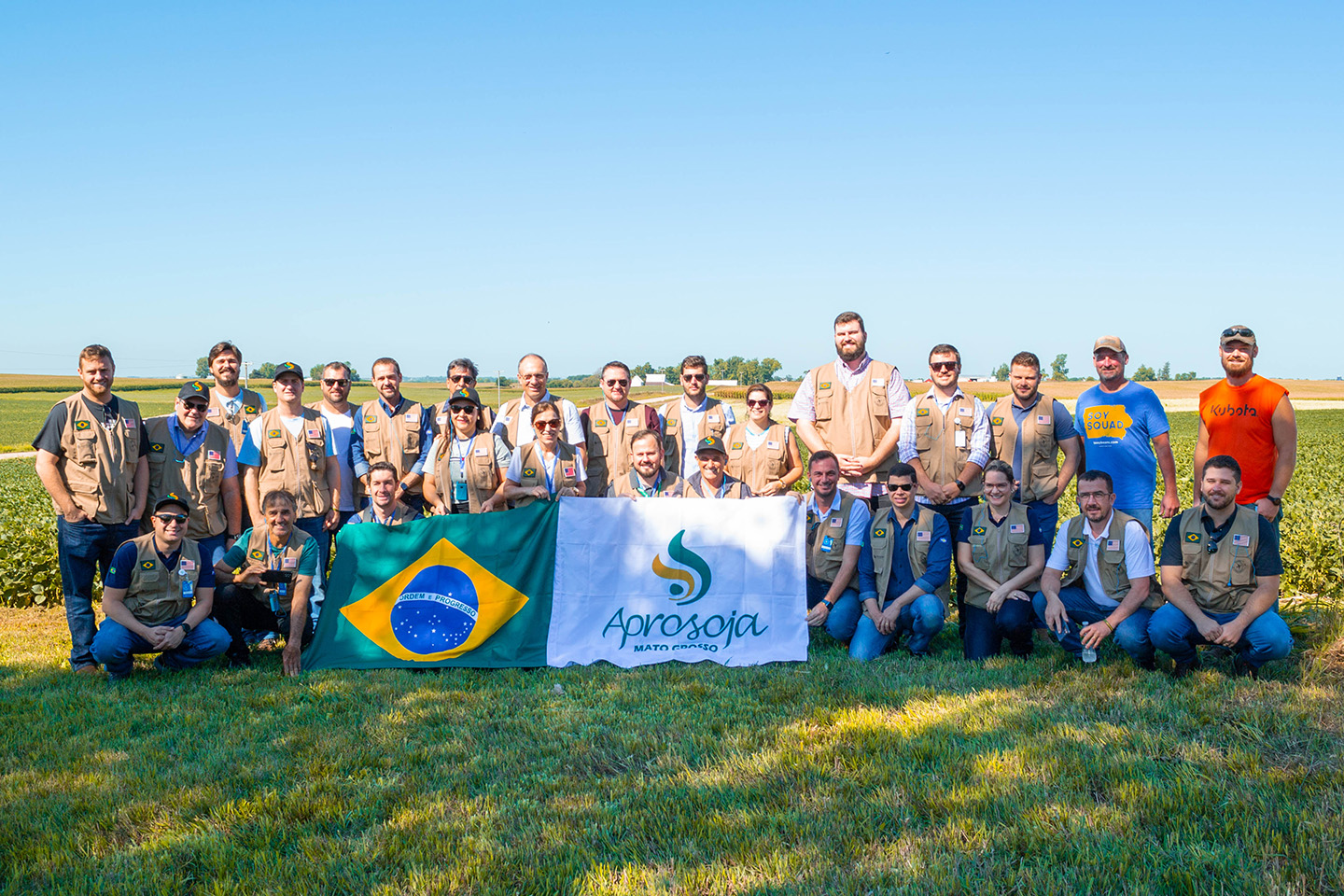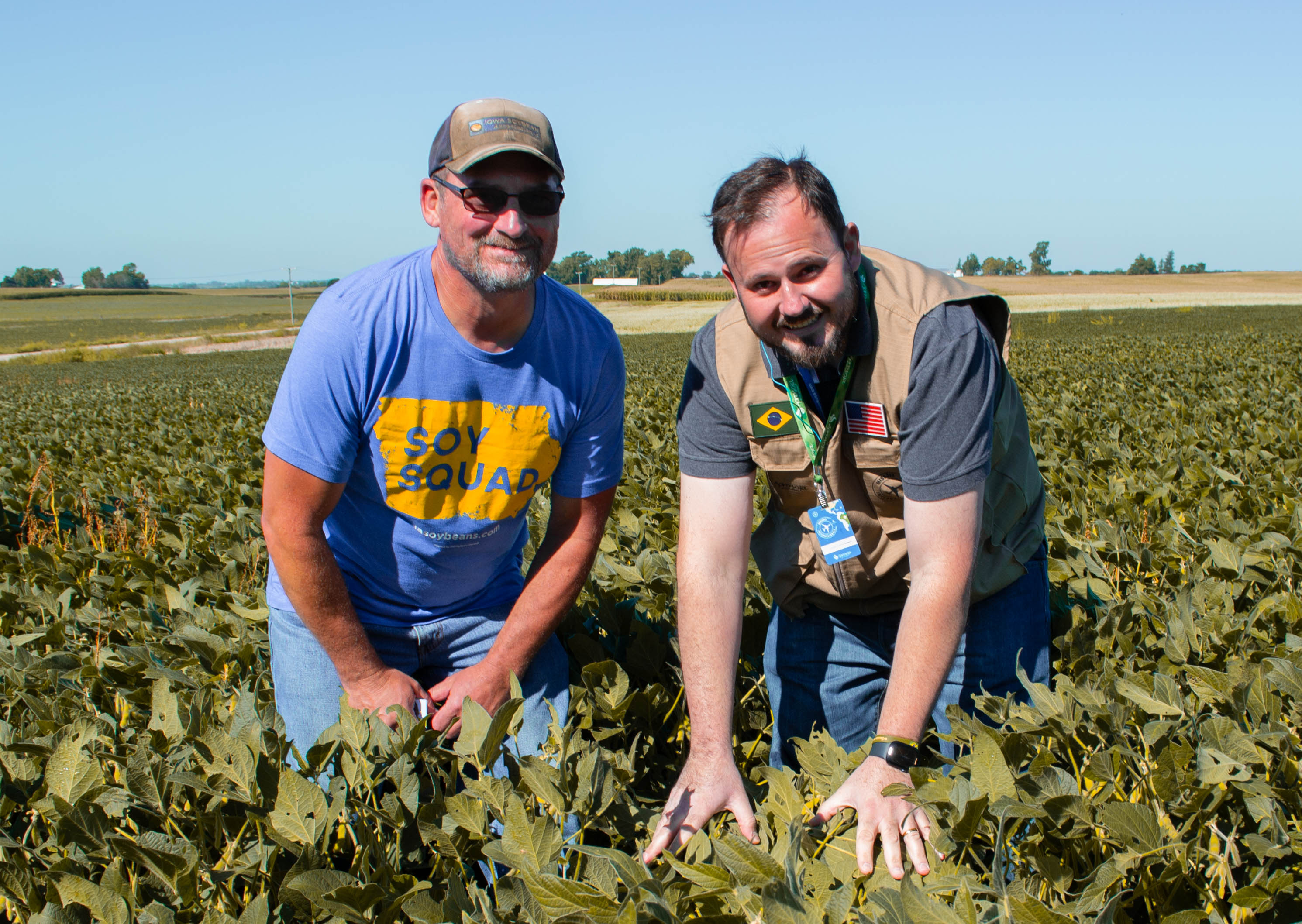
A delegation of farmers from Brazil visited ISA director Tim Bardole's farm last week during a visit to Iowa. (Photo: Kriss Nelson/Iowa Soybean Association).
A firsthand look at U.S. farming
September 8, 2022 | Kriss Nelson
Last week, a delegation of farmers from Brazil stopped to talk shop at Tim Bardole’s farm near Rippey.
Bardole, serving as an At-Large Director for the Iowa Soybean Association (ISA) and as director for the United Soybean Board welcomed the group to his multi-generational farm where he grows soybeans and corn and raises hogs with his father, brother and son.
Bardole is no stranger to hosting visits to his farm, but this visit was a little special after visiting Mato Grosso last winter.
“After spending two weeks in Brazil and being on farms, I was thrilled to have farmers from Brazil come to our operation and discuss what is similar and all that is different,” says Bardole. “When you come right down to it, farmers are farmers. It doesn’t matter if you are in the United States, Brazil, or anywhere in the world.”
The farmers questioned Bardole on various topics, including USDA yield estimates, crop rotation, etc.
“They asked the same questions we asked when we were there,” says Bardole. “It’s everything a farmer thinks about: finances, yields and different ways of controlling pests, whether it be weeds or insects.”
Lucas Costa Beber from Nova Mutum, in Mato Grosso, Brazil, was a part of the group. Beber serves as vice president of Mato Grasso Aprosoja - the Brazilian Association of Soy Producers, and vice president of the country’s national association representing Mato Grasso.
“Each year, we go on a tour to the U.S. as a reference to us,” he says. “For many years, growers have created the habit of coming to the U.S. and to visit the Farm Progress Show.”

- Rippey-area farmer and ISA director Tim Bardole and Lucas Costa Beber from Nova Mutum, in Mato Grosso, Brazil look over Bardole's soybean field during a visit with 30 farmers from Brazil to Bardole's farm. (Photo: Kriss Nelson/Iowa Soybean Association).
After each visit, the group reports back to the farmers they represent in Brazil.
“We show the difficulties U.S. farmers also face like ourselves,” he says. “There are some advantages here; for instance, in the U.S., corn is still the main crop. Whereas for us, it is the opposite. Soybeans are the main crop. But, today, we also have the advantage of having many corn ethanol plants we didn’t have in the past. Corn is becoming more advantageous to us as well.”
Brazilian farmers visit each year during the Farm Progress Show, talking to farmers in Iowa and Illinois while also taking an up-close look at crop progress.
And what were their impressions?
“We came from Chicago to Des Moines, and that is a small area to reference, but we see many beautiful crops, especially soybeans, which is unlike the USDA information we have received in Brazil,” he says. “To us, as the U.S. is a major producer, we also come here to make our trading decisions in Brazil.”
In addition to their visit to the Farm Progress Show and various farms, the group visited a Corteva seed processing plant and Iowa State University. Beber says these visits help create more contacts and learn about new technologies being developed.
“We see in the U.S., universities are closer to farmers, and in Brazil, we are trying to do the same. To add forces and provide more technology to farmers, so our business becomes more viable,” he says.
Beber has visited the Farm Progress Show four times and recalls his father’s visit to the show 25 years ago.
“I remember when my father came in 1997, it seemed the U.S. was 50 years ahead of us,” he says. “And today, we see the situation has leveled out regarding technology use. But, we want to see new trends in U.S. agriculture.”
Back